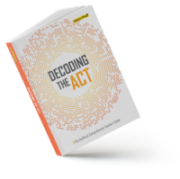

Written by: Craig Gehring, Founder and CEO of MasteryPrep
Ask a student what ACT score he wants. He might be able to tell you. “24,” he might say. Or “27.” Then ask him what that means. How many questions does he need to answer correctly? The most common answer to that question is a shrug.
A student who is fully prepared for the ACT has the answer to that question. She knows exactly how many questions she must answer correctly to reach her target score for each subject. She knows how many tough questions she can afford to skip. Her time management strategies are informed by her goals.
This video gives the full details on how the ACT is scored:
Here are three takeaways:

These tips are adapted from our Decoding the ACT, professional development program.
Click here to learn more.
Other Test-Prep Solutions:
ACT Mastery
ACT Boot Camp
Professional Development
TruScore ACT Practice Testing and Analytics